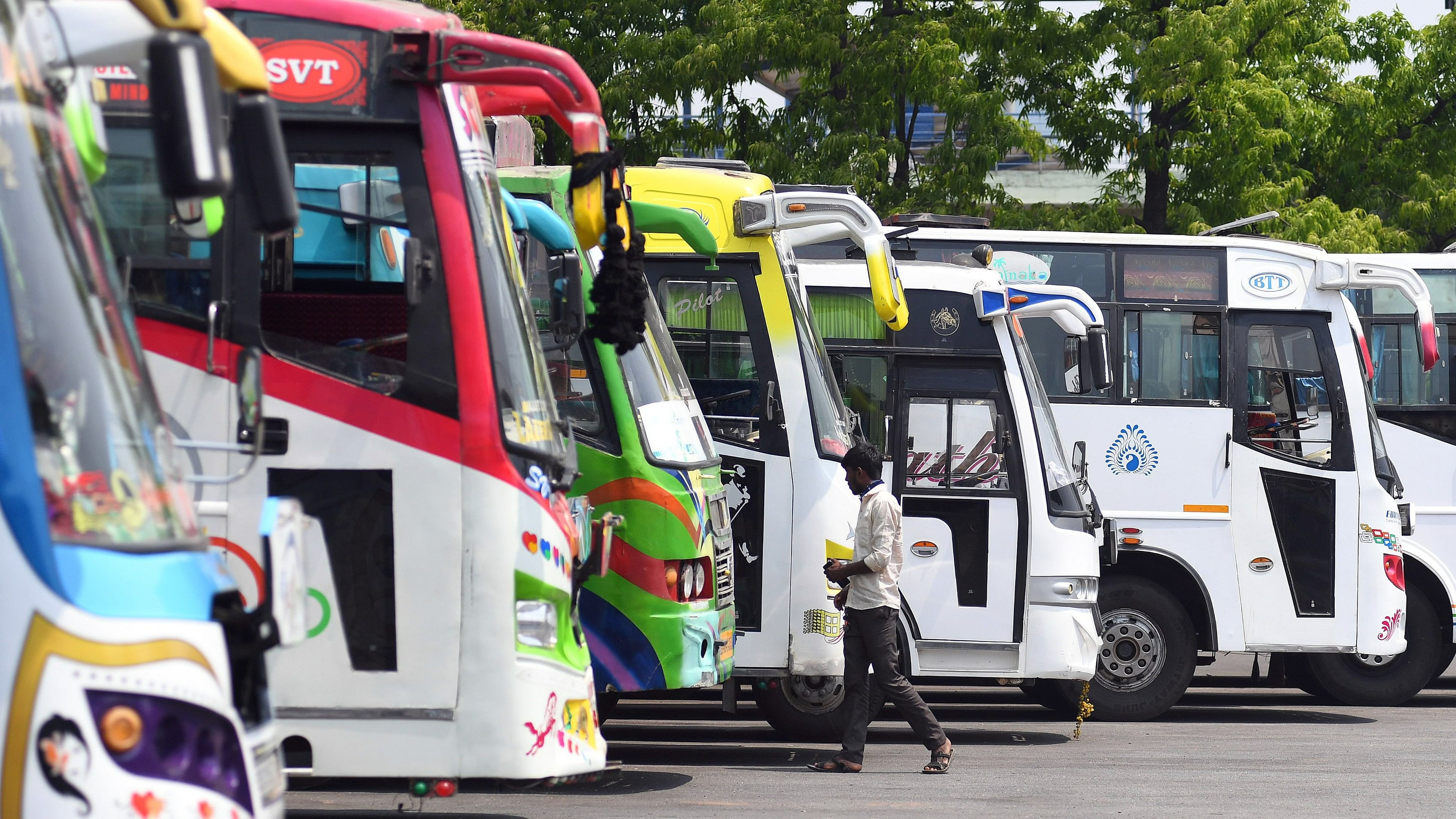
Passengers wait to board private buses during the indefinite strike called by RTC workers, at Kempegowda Bus Stand, Majestic in Bengaluru on Friday, April 09, 2021.
Credit: DH Photo/Pushkar V
Scores of passengers were left in the lurch when a Thiruvananthapuram-bound private bus was stopped in Tamil Nadu last week. The overnight bus departed from Bengaluru roughly five hours before it was intercepted at Salem.
The Tamil Nadu government’s decision to ban private buses not registered in Tamil Nadu has resulted in the quandary, which has reportedly affected thousands of travellers.
Tania Sarah Thomas, who was supposed to be on the bus to Thiruvananthapuram, was unable to make it in time. The following day, she learnt that passengers were forced to disembark at Salem and asked to find alternate ways of reaching their destination, says Tania, a student at a Bengaluru college.
Passengers bound for Bengaluru from Kerala have also been facing issues. Joel M Jacob, lecturer at a city college, was on a bus from Chengannur, Kerala, to Bengaluru last Tuesday. The bus was supposed to arrive in Bengaluru at 6.45 am. However, after being forced to take an alternate route, it reached the city around 1 pm. “The driver had to take the longer route through Kerala to avoid being stopped in Tamil Nadu. We ended up driving through north Kerala, Kodagu and Mysuru,” he shares.
Longer routes
The operator, Jai Sai Roadlinks, has since re-registered two of their buses with RTOs in Chennai, says a representative. The rest have been using alternative routes.
Adarsh S of Murahara Travels, whose bus was intercepted at Salem, shares that buses are being stopped despite having all the permits. “We even have a Supreme Court order stating that we have an all-India permit. Despite showing it to the TN authorities, our buses were seized,” he states. Two of their buses were impounded — one at Salem, and the other at Nagercoil. Murahara, which runs 13 buses per day between Bengaluru and Thiruvananthapuram, has also changed its routes. “We now go via Ernakulam and Coimbatore. So far we have not been stopped at Coimbatore,” he explains.
Passengers travelling to Bengaluru from southern Tamil Nadu have also been affected by the issue. Many of the buses plying the route originate in Kerala. As these buses are avoiding the Tamil Nadu route, people in the border towns are left with fewer travel options. Some have been forced to delay their travel by a few days due to the non-availability of tickets.
All permits in place
S Nataraj Sharma, Federation of Karnataka State Private Transport Association, says the Federation has written to Karnataka transport minister Ramalinga Reddy to intervene. “This is a violation of the Motor Vehicles Act. The vehicles are being stopped illegally. The authorities are demanding fines of
Rs 10,000 to Rs 20,000. Non-compliance results in impoundment,” says Sharma. He claims that all the operators under the Federation have all the documents in order. “We have shown valid documents. And yet, they are continuing to seize the buses. We hope the authorities will find a solution soon,” he adds.
The Karnataka transport commissioner was unavailable for comment.
What happened
Since June 13, the Tamil Nadu Transport and Motor Vehicles Department has been imposing restrictions on buses not registered in Tamil Nadu. TN transport minister, S S Sivasankar, levelled several allegations against the bus operators for tightening the restrictions. He stated that only buses registered in other states and that breached the All India Tourist Permit (AITP) rules were being impounded. He added that buses registered elsewhere but operating in TN have caused huge losses for the TN government. They are losing out on revenue to the tune of Rs 4.32 lakh per bus annually, according to the minister.
His statement also said that buses registered in Nagaland and other states had obtained All India Permits by producing fake documents. Of the 905 omni buses that had violated the norms, only 112 cancelled their registration and re-registered in Tamil Nadu. The rest were still operating illegally, he said. He commented on the design of the buses and alleged that they were in violation of the All India Bus Body Code.